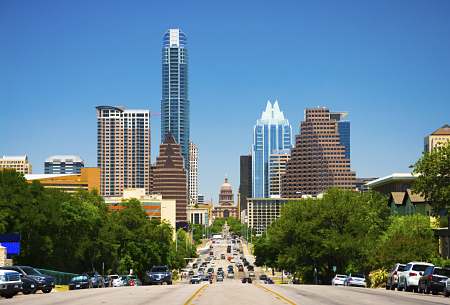Ride-hail giants Uber and Lyft are facing a May 7 showdown vote in Austin, Texas over the city’s passage of a December ordinance that requires drivers to submit to fingerprint background checks to operate in the state capital.

After Uber and Lyft-supported groups gathered more than 65,000 petition signatures to force a vote for repeal of the ordinance, the council voted 8-2 to send the matter to the voters.
Austin Mayor Austin Mayor Steve Adler said the program aims to balance two competing safety issues. One is the positive benefit of ride hailing services giving people an alternative to driving drunk, as well as more options to get around the city. The other is the argument by public safety officials who say that fingerprinting drivers is necessary for safety.
“I didn’t like the thought of having to choose,” said Adler.
Uber and Lyft argue that the fingerprinting is redundant because they already do their own background checks on drivers. They also say it fails to increase safety.
Drivers who register and submit to the background checks receive a decal on their cars and access to premium sites like Austin’s airport and the city’s may festivals.
Supporters say the program is an important step in increasing passenger safety that could ultimately help improve business for ride hailing companies. But those companies are adamantly opposed to the initiative because it opens the door to future regulation that they say can hamper innovation.
“We believe the city council’s action should be guided by the over 65,000 Austinites who trust their voice of disapproval will be heard,” said a Lyft spokeswoman. “Segregating rideshare drivers into different groups, with different economic opportunities – all without any benefit to public safety – hurts drivers, consumers and the City of Austin.”
An Uber spokeswoman expressed similar concerns, adding that “Austin drivers can currently pick up any rider in any part of the city at any time. Under the ‘incentives program’, drivers who are not fingerprinted would lose access to the busiest areas of town and major community events.”
According to the mayor’s office, several parts of the December ordinance are in conflict on whether fingerprinting is mandatory for all drivers. The city council will likely amend or rewrite certain sections to address the problems in the ordinance, which won’t go into effect until the end of February.
For Uber and Lyft, the greater danger in Austin is the potential of the city setting a precedent that could be replicated in other markets. Uber is available in more than 300 cities worldwide and Lyft operates in 65 U.S. cities.
The mayor’s office says it views Uber and Lyft fundamentally as technology companies that shouldn’t be regulated like taxi companies. It also tried to reassure them by saying it recognizes that their businesses will evolve over time and that it does not want government to be an obstacle.
Both companies are already fighting other battles that could imperil their businesses, most notably over their classification of drivers as independent contractors instead of employees.
Mayor Adler said he hopes that drivers will be motivated to participate by the incentives that are included like the ability to pick up passengers at the airport. Last year, San Antonio approved a similar program, but the mayor’s office in Austin says the San Antonio version failed to get much traction because it lacked enough incentives to make drivers want to participate.
“I think we have a lot of people in the city, a lot of drivers who would be willing to get fingerprinted,” said Adler.
He emphasized that the voluntary program wouldn’t prevent anything these companies and their drivers can currently do. It would only add to their businesses.
The battle over background checks came to a head in 2014 when the city council approved rules for transportation network companies. The ride-hail companies found the rules favorable but things turned adversarial when the council starting looking at adding background checks last year.
Uber and Lyft went public in opposition to the background checks, even running a TV commercial and threatening to take the services out of the city.
